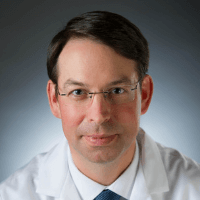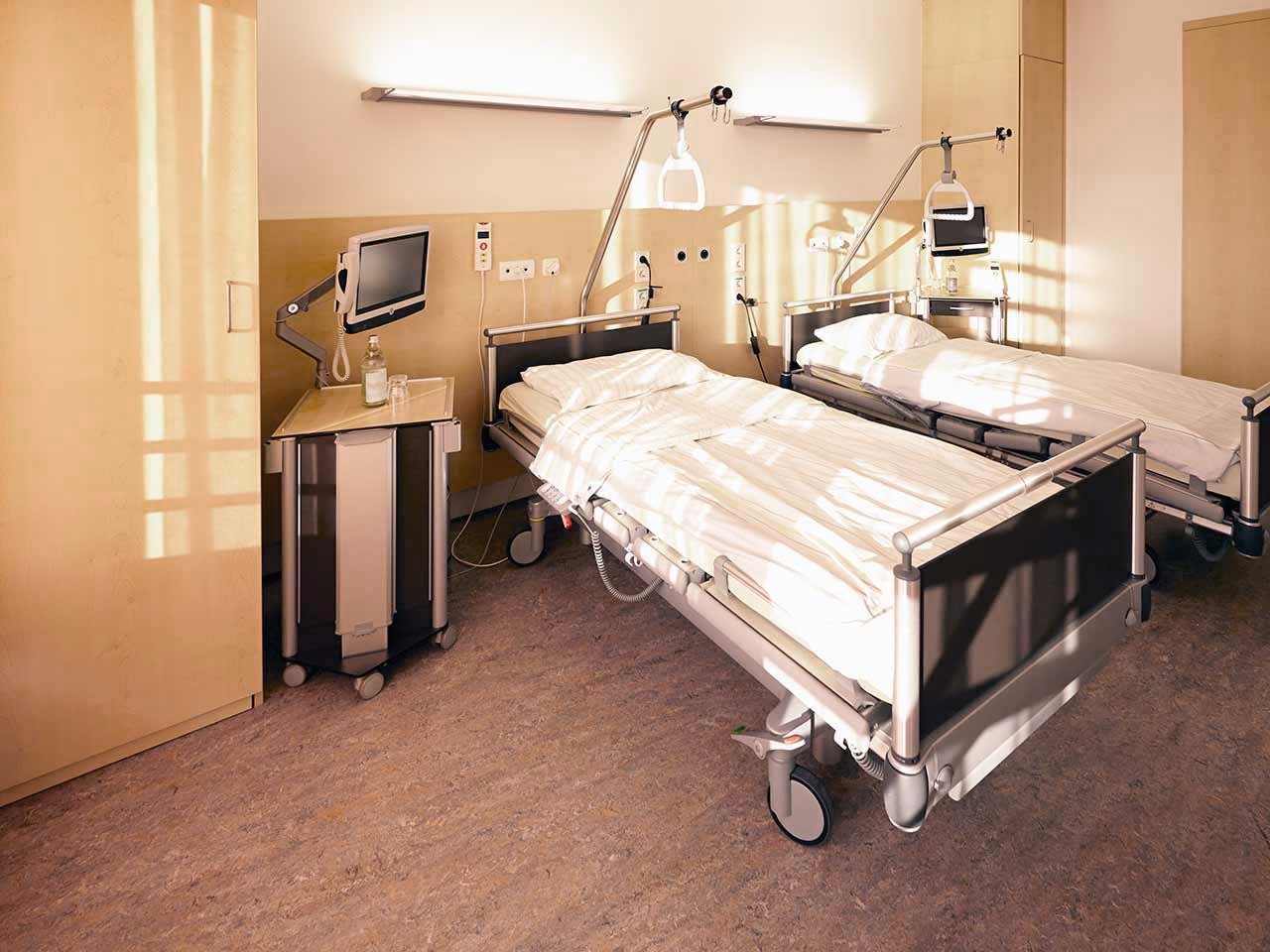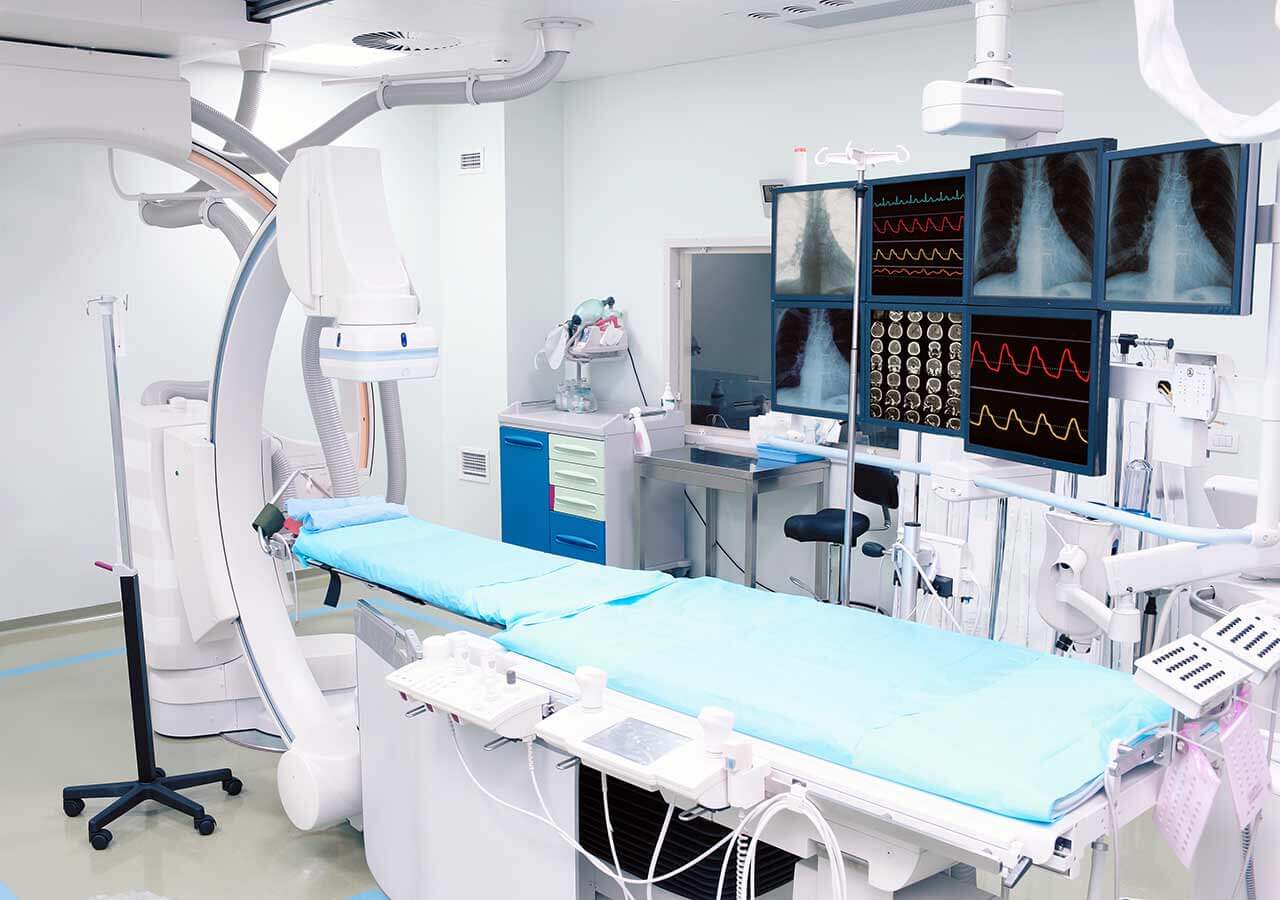
The program includes:
- Initial presentation in the clinic
- clinical history taking
- review of medical records
- physical examination
- laboratory tests:
- complete blood count
- biochemical analysis of blood
- thyroid function test (TSH-basal, fT3, fT4)
- mineral metabolism analysis (Na, K, Ca, Mg)
- lipid metabolism (HDL/LDL, cholesterol, triglycerides,
Lip(a), homocysteine) - iron content (ferritin, iron)
- blood coagulation analysis (aPTT, PT, INR)
- metabolic status (uric acid, total glucose, HbA1c)
- inflammatory parameters (CRP, ESR)
- cardiovascular disease risk markers
- lung function test (Spirometry)
- resting and exercise ECG
- vessel elasticity measurement
- Holter monitoring (24h)
- body fat and water examination
- color doppler echocardiography
- transesophageal echocardiography (tee)
- color doppler sonography of cerebral vessels
- closed ablation under 3-d mapping
- symptomatic treatment
- control examinations
- the cost of essential medicines and materials
- nursing services
- full hospital accommodation
- explanation of future recommendations
Required documents
- Medical records
- ECG (if available)
Service
You may also book:
 BookingHealth Price from:
BookingHealth Price from:
About the department
According to the Focus magazine, the Department of Cardiology, Angiology, Pulmonology and Intensive Care at the University Hospital Jena ranks among the top German medical facilities of this kind!
The department offers the full range of diagnostic and therapeutic services in these fields. The main areas of specialization include interventional cardiac catheterization, including stent implantation, treatment of myocardial infarction, structural heart diseases, interventional therapy of heart valve (for example, TAVI and MitraClip techniques), electrophysiological examinations, ablation procedures, implantation of pacemakers and defibrillators, as well as diagnostic and interventional angiology, highly specialized treatment of lung diseases. The emergency cardiac care is provided in the department around the clock. The department operates in accordance with the very latest medical standards and has DIN EN ISO 9001 certification. The Chief Physician of the department is Prof. Dr. med. Paul Christian Schulze.
The department annually diagnoses and treats more than 6,000 inpatients and more than 30,000 outpatients, therefore it has earned the reputation as one of the largest centers for the treatment of heart and lung diseases in Germany. The department has 125 beds for inpatient treatment and 23 beds in the intensive care unit, 12 of which are equipped with a heart-lung machine. In addition, the specialists of the intensive care unit have long experience in the application of mechanical cardiac support systems. Also, the department operates four modern Cardiac Catheterization Laboratories, one of which was developed as a hybrid laboratory, and another one is equipped with all the technologies for electrophysiological examinations and ablation. Within the Cardiac Catheterization Laboratories, the entire spectrum of invasive cardiological services is carried out. It ranges from the diagnostics of right and left heart, balloon dilatation, stent implantation, transcathether aortic valve implantation (TAVI) to the implantation of pacemakers, defibrillators, electrophysiological examinations and cryoablation.
In the field of pulmonology, the main focus is on the diagnostics and treatment of diseases of the lungs and pleura, obstructive diseases (asthma, chronic obstructive bronchitis), inflammatory, autoimmune and interstitial lung diseases (pulmonary fibrosis of various etiologies) and lung cancer. The patients with advanced stages of lung diseases are offered the treatment using non-invasive ventilation.
The department’s angiologists provide a comprehensive and effective treatment of atherosclerosis of the pelvic vessels, lower and upper limbs, neck. Thanks to the special progressive diagnostic techniques, the specialists can identify vascular pathologies at the initial stages. Also, the department's tasks are the treatment of deep vein thrombosis and more rare pathologies, such as Raynaud syndrome, inflammatory lesions of blood vessels, etc. The state-of-art functional laboratory has special equipment for capillary microscopy, which allows for the most accurate diagnostics of pathological changes even in the smallest vessels (microcirculatory bloodstream). In addition, the diagnostic options cover duplex ultrasonography, stress-rest Doppler assessment of blood flow, etc.
The department’s intensive care is designed for the provision of care for patients with life-threatening cardiac diseases, for example, cardiogenic shock, decompensated heart failure and severe types of arrhythmia. It also provides medical care for patients with respiratory failure, septic shock, acute kidney failure, gastrointestinal hemorrhage, acute liver failure, conditions after cardiopulmonary resuscitation and complications in oncological, rheumatic and endocrine diseases. The intensive care unit offers all modern procedures, such as prolonged mechanical ventilation, circulatory support systems, renal replacement therapy, microcatheters, and monitoring systems.
The main clinical focuses of the department include:
- Functional heart diagnostics
- Electrocardiography (including the transthoracic, transesophageal one)
- Ultrasound examinations
- Cardiac CT
- Cardiac MRI
- Diagnostics and treatment of all types of heart failure
- Invasive heart diagnostics and coronary interventions (percutaneous coronary interventions/percutaneous transluminal coronary angioplasty)
- Diagnostics and treatment of structural heart diseases, valvular diseases
- Percutaneous aortic valve replacement using catheter techniques (transcatheter aortic valve implantation (TAVI))
- Percutaneous pulmonary valve replacement using catheter techniques
- Percutaneous mitral valve repair (Mitraclip)
- Balloon valvuloplasty
- Diagnostics and treatment of heart rhythm disorders (arrhythmias)
- Catheter ablation
- Pacemaker implantation
- Defibrillator implantation
- Diagnostics and treatment of vascular diseases (angiology)
- Drug therapy
- Percutaneous transluminal angioplasty
- Stent implantation
- Invasive treatment of vascular ruptures and aneurysms using stents and coiling
- Pulmonary function tests
- Spirometry
- Ergospirometry
- Rhinomanometry
- Body plethysmography
- Peak flowmetry
- Pulse oximetry
- Blood gas test
- Intensive care
- Prolonged mechanical ventilation
- Circulatory support systems
- Renal replacement therapy
- Monitoring systems
- Other medical services
Curriculum vitae
Education
- 1991 - 1998 Study of Medicine, University of Leipzig, Germany.
- 1996 Exchange Medical Student, Baylor College of Medicine, Houston, Texas.
- 1997 - 1998 Subinternship at the University of Buenos Aires, Argentina (Surgery), Yale School of Medicine (Department of Neurology and Gastroenterology), New Haven, CT, and Cornell University School of Medicine (Gynecology), New York, NY.
- 1994 - 1999 Research Fellow, Department of Neuropathology, University of Leipzig, Germany. Thesis subject: "Laser-induced Tissue Alterations in the Human Brain"; May 1999.
Professional Career
- 1998 - 2001 Resident in Internal Medicine/Cardiology, University of Leipzig.
- 2005 - 2007 Resident in Internal Medicine, Boston University Medical Center.
- 2007 - 2009 Clinical Fellow in Cardiovascular Medicine, New York-Presbyterian Hospital/Columbia University Medical Center.
- 2012 - 2014 Director, Geier Clinical Research Center, Center of Advanced Cardiac Care, New York-Presbyterian Hospital/Columbia University Medical Center.
- 2012 - 2014 Director of the Research Group, Center of Advanced Cardiac Care, New York-Presbyterian Hospital/Columbia University Medical Center.
- Since 2015 Chief Physician of the Department of Cardiology, Angiology, Pulmonology and Intensive Care, University Hospital Jena.
Photo of the doctor: (c) Universitätsklinikum Jena
About hospital
According to the prestigious Focus magazine, the University Hospital Jena regularly ranks among the top German medical facilities!
The hospital has positioned itself as a multidisciplinary medical facility with a long history of more than 200 years. Since its foundation, the hospital has been constantly developing and modernizing, thanks to which nowadays it offers patients the highest level of treatment in Germany based on the use of innovative technologies and the very latest therapeutic techniques. The hospital consists of 26 specialized departments and 25 research institutes. It treats more than 53,600 inpatients and about 274,000 outpatients every year. The staff of the hospital includes more than 5,600 competent doctors.
The extensive resources of the university hospital, high treatment standards, and the introduction of new research developments provide first-class treatment in Germany meeting the stringent international standards. The hospital has an excellent reputation not only in Germany, but also far beyond its borders, due to which it accepts a large number of foreign patients for the diagnostics and treatment.
Despite the technical progress and the availability of accurate computerized systems, the patient’s physical health and emotional state is the main value of each employee of the hospital, since some diagnoses cause emotional distress in patients. The doctors of the hospital believe that the key to a successful result is a comprehensive and individual approach, so they spend a lot of time talking with patients, listen carefully to all their wishes and support at all stages of the therapeutic process. All this in combination with high-precision diagnostic techniques and the very latest types of therapy forms a solid basis for the achievement of an optimal treatment result.
Photo: (c) depositphotos
Accommodation in hospital
Patients rooms
The patients of the University Hospital Jena live in comfortable single and double rooms made in a modern design. Each patient room is equipped with an ensuite bathroom with shower and toilet. The room has enough space to store personal belongings, as well as a table and chairs for receiving visitors. A bedside table can be converted into a table so that patients can eat right in their bed. Each room has a TV, and there is also access to the Internet. In addition, the hospital offers enhanced-comfort rooms.
Meals and Menus
The patient and his accompanying person have a daily choice of three menus. If for some reason the patient does not eat all the foods, he will be offered an individual menu. Please inform the medical staff about your dietary preferences prior to the treatment.
Further details
Standard rooms include:
Religion
Religious services are available upon request.
Accompanying person
During the inpatient program, an accompanying person may stay with you in a room or at the hotel of your choice.
Hotel
During the outpatient program, you can live at a hotel of your choice. Managers will help you to choose the most suitable options.





